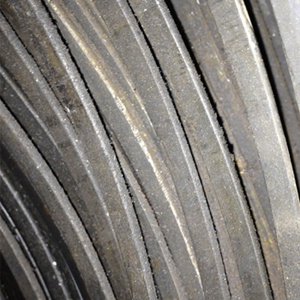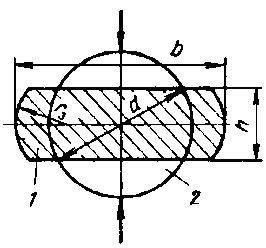|
НОВИНКА! - Оптовая продажа отрезных и зачистных кругов Проволока с ПВХ покрытием В продаже появились: - Технологические газы компании "Линде Газ" - Комплектующие и расходники для сварки и металлообработки - Оцинкованая проволка |
Flattened wire
 We are a manufacturer of low carbon steel rolled wire. Flattened wire is a narrow metal strip with a ratio of width b to thickness h of 1.3–20 (and sometimes more), obtained from a round wire by changing its cross section from round to rectangular by squeezing perpendicular to the longitudinal axis. As a result of compression, the edges of the tape become rounded.
We are a manufacturer of low carbon steel rolled wire. Flattened wire is a narrow metal strip with a ratio of width b to thickness h of 1.3–20 (and sometimes more), obtained from a round wire by changing its cross section from round to rectangular by squeezing perpendicular to the longitudinal axis. As a result of compression, the edges of the tape become rounded.
Flattened tape is produced in an ever-increasing quantity, since due to the constantly expanding areas of its application, the need for it increases. This is due to the advantages of the method of its manufacture compared to conventional rolling of the tape of the same type from a flat billet and longitudinal cutting of a wide strip into narrow ones, as well as high quality characteristics of the flattened tape.
 By flattening, you can get a steel strip of almost any thickness ranging from 0.01 mm to 10 mm (and by ordinary cold rolling on modern strip mills - not more than 8 mm thick) and an arbitrarily small width (its maximum width currently does not exceed 30 mm). It is difficult to produce a tape with a width of less than 5 mm by longitudinally cutting a wide strip into narrow stripes.
By flattening, you can get a steel strip of almost any thickness ranging from 0.01 mm to 10 mm (and by ordinary cold rolling on modern strip mills - not more than 8 mm thick) and an arbitrarily small width (its maximum width currently does not exceed 30 mm). It is difficult to produce a tape with a width of less than 5 mm by longitudinally cutting a wide strip into narrow stripes.
Springs are made from flattened tape for the automotive and aircraft industries, instrumentation, and agricultural engineering. It is used as a material for the manufacture of saws, bushings of motorbike chains, rollers, rolling bearings, frames for upholstered furniture. An example of the successful use of flattened tapes is the use of tapes for piston rings of automobile and tractor engines. Rings from such a tape provide uniform lubrication of the cylinder walls, significantly reduce oil and fuel consumption. The use of steel piston rings instead of cast iron allowed to significantly increase the durability of parts of the cylinder-piston group of engines, to simplify and completely automate the process of manufacturing rings, to eliminate the laborious foundry.









